Consultancy Report: Tesco HR Policies and Recommendations
VerifiedAdded on 2020/01/06
|10
|3499
|371
Report
AI Summary
This consultancy report provides an executive summary of Tesco's HR policies, focusing on their competitive strategy and its alignment with human resource management. The report examines existing HR policies, including equal employment opportunity, overtime compensation, and termination policies. It highlights key issues such as low motivation and the need for enhanced skills and knowledge within the workforce. Recommendations include implementing effective training and development programs, offering flexible working hours, and considering employee feedback when developing HR policies. The report emphasizes the importance of aligning HR policies with the company's competitive strategy to achieve its goals, gain a competitive advantage, and improve employee satisfaction. The report also touches upon Tesco's use of ERP and CRM software to gain market insights and make informed decisions.
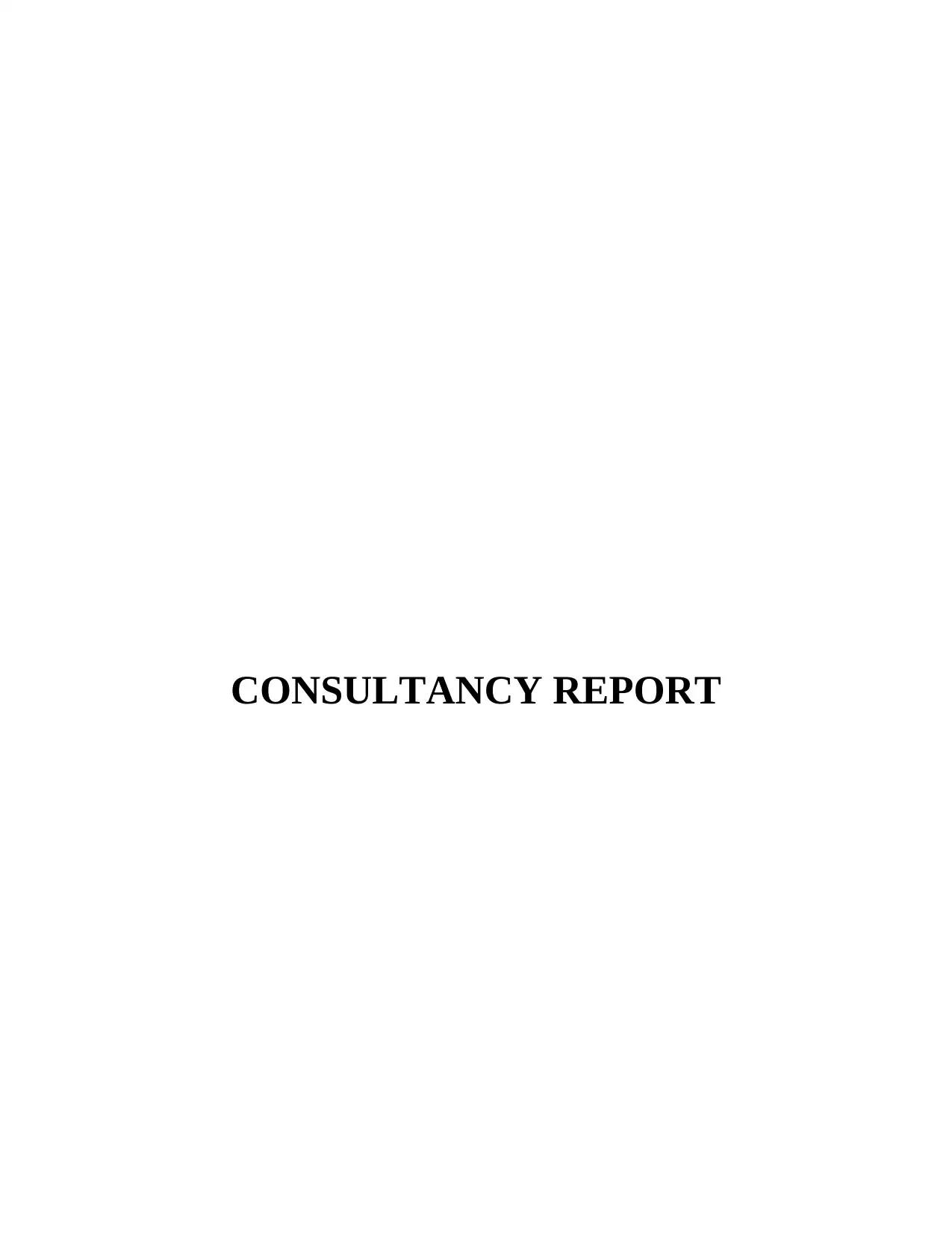
CONSULTANCY REPORT
Paraphrase This Document
Need a fresh take? Get an instant paraphrase of this document with our AI Paraphraser
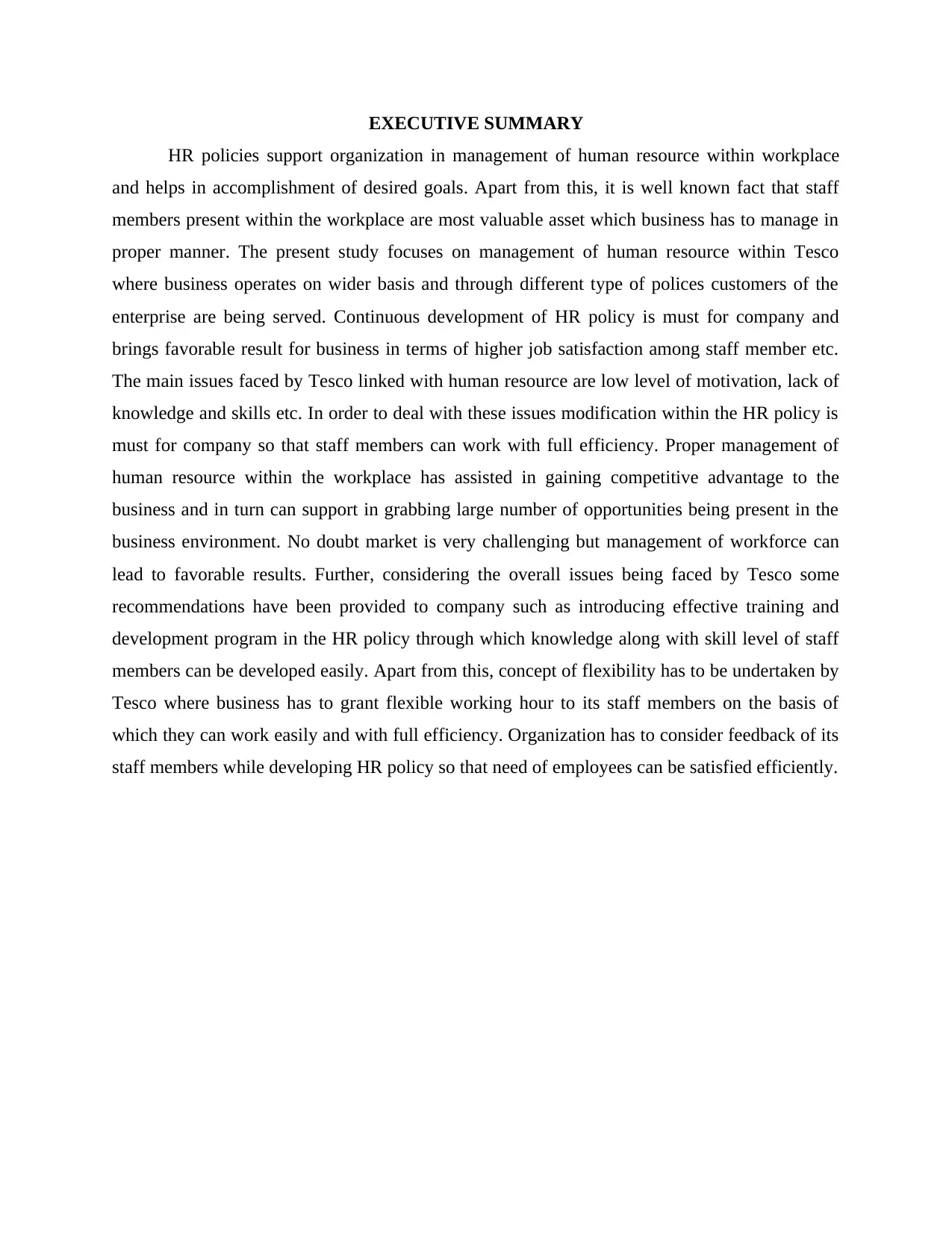
EXECUTIVE SUMMARY
HR policies support organization in management of human resource within workplace
and helps in accomplishment of desired goals. Apart from this, it is well known fact that staff
members present within the workplace are most valuable asset which business has to manage in
proper manner. The present study focuses on management of human resource within Tesco
where business operates on wider basis and through different type of polices customers of the
enterprise are being served. Continuous development of HR policy is must for company and
brings favorable result for business in terms of higher job satisfaction among staff member etc.
The main issues faced by Tesco linked with human resource are low level of motivation, lack of
knowledge and skills etc. In order to deal with these issues modification within the HR policy is
must for company so that staff members can work with full efficiency. Proper management of
human resource within the workplace has assisted in gaining competitive advantage to the
business and in turn can support in grabbing large number of opportunities being present in the
business environment. No doubt market is very challenging but management of workforce can
lead to favorable results. Further, considering the overall issues being faced by Tesco some
recommendations have been provided to company such as introducing effective training and
development program in the HR policy through which knowledge along with skill level of staff
members can be developed easily. Apart from this, concept of flexibility has to be undertaken by
Tesco where business has to grant flexible working hour to its staff members on the basis of
which they can work easily and with full efficiency. Organization has to consider feedback of its
staff members while developing HR policy so that need of employees can be satisfied efficiently.
HR policies support organization in management of human resource within workplace
and helps in accomplishment of desired goals. Apart from this, it is well known fact that staff
members present within the workplace are most valuable asset which business has to manage in
proper manner. The present study focuses on management of human resource within Tesco
where business operates on wider basis and through different type of polices customers of the
enterprise are being served. Continuous development of HR policy is must for company and
brings favorable result for business in terms of higher job satisfaction among staff member etc.
The main issues faced by Tesco linked with human resource are low level of motivation, lack of
knowledge and skills etc. In order to deal with these issues modification within the HR policy is
must for company so that staff members can work with full efficiency. Proper management of
human resource within the workplace has assisted in gaining competitive advantage to the
business and in turn can support in grabbing large number of opportunities being present in the
business environment. No doubt market is very challenging but management of workforce can
lead to favorable results. Further, considering the overall issues being faced by Tesco some
recommendations have been provided to company such as introducing effective training and
development program in the HR policy through which knowledge along with skill level of staff
members can be developed easily. Apart from this, concept of flexibility has to be undertaken by
Tesco where business has to grant flexible working hour to its staff members on the basis of
which they can work easily and with full efficiency. Organization has to consider feedback of its
staff members while developing HR policy so that need of employees can be satisfied efficiently.
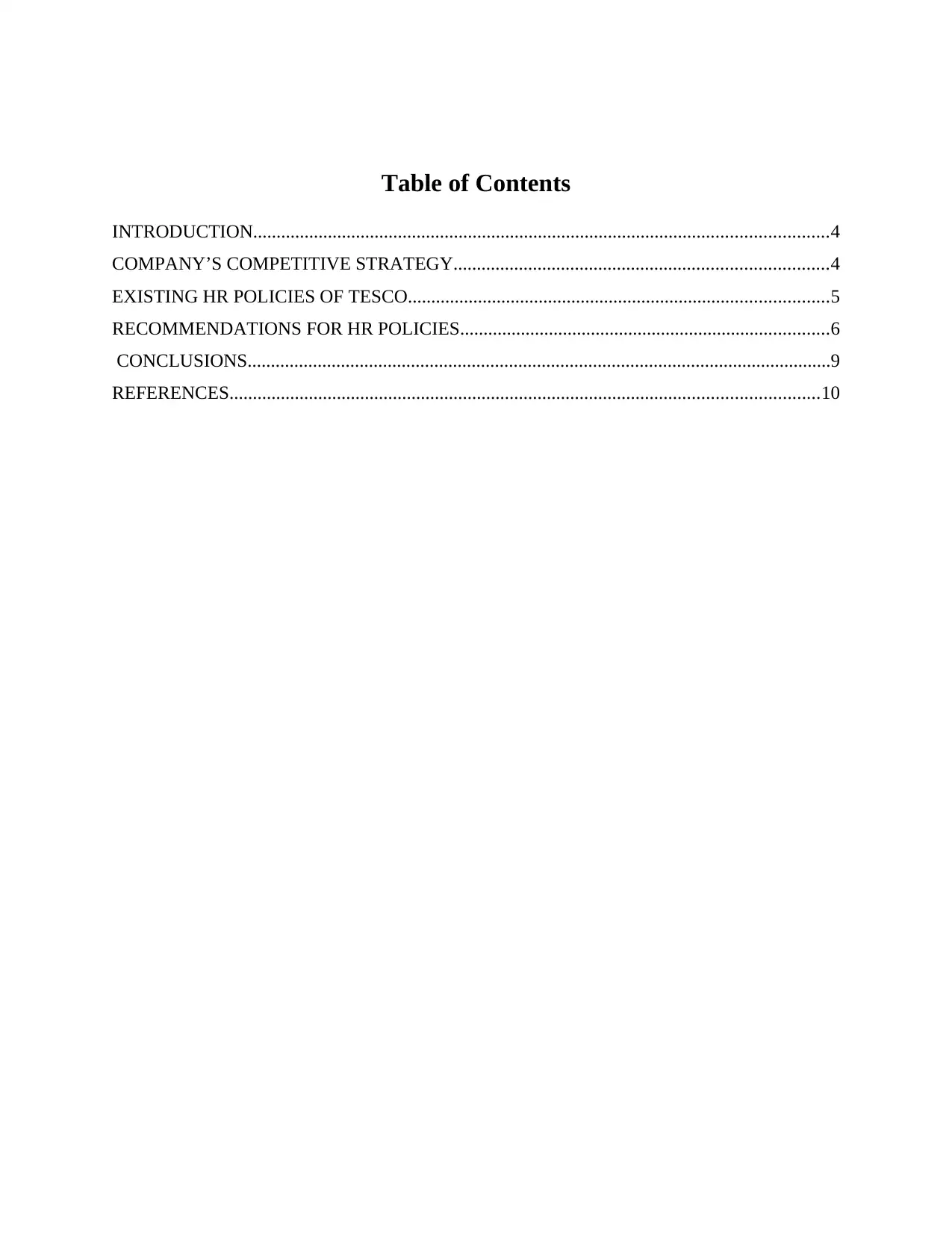
Table of Contents
INTRODUCTION...........................................................................................................................4
COMPANY’S COMPETITIVE STRATEGY................................................................................4
EXISTING HR POLICIES OF TESCO..........................................................................................5
RECOMMENDATIONS FOR HR POLICIES...............................................................................6
CONCLUSIONS.............................................................................................................................9
REFERENCES..............................................................................................................................10
INTRODUCTION...........................................................................................................................4
COMPANY’S COMPETITIVE STRATEGY................................................................................4
EXISTING HR POLICIES OF TESCO..........................................................................................5
RECOMMENDATIONS FOR HR POLICIES...............................................................................6
CONCLUSIONS.............................................................................................................................9
REFERENCES..............................................................................................................................10
⊘ This is a preview!⊘
Do you want full access?
Subscribe today to unlock all pages.

Trusted by 1+ million students worldwide
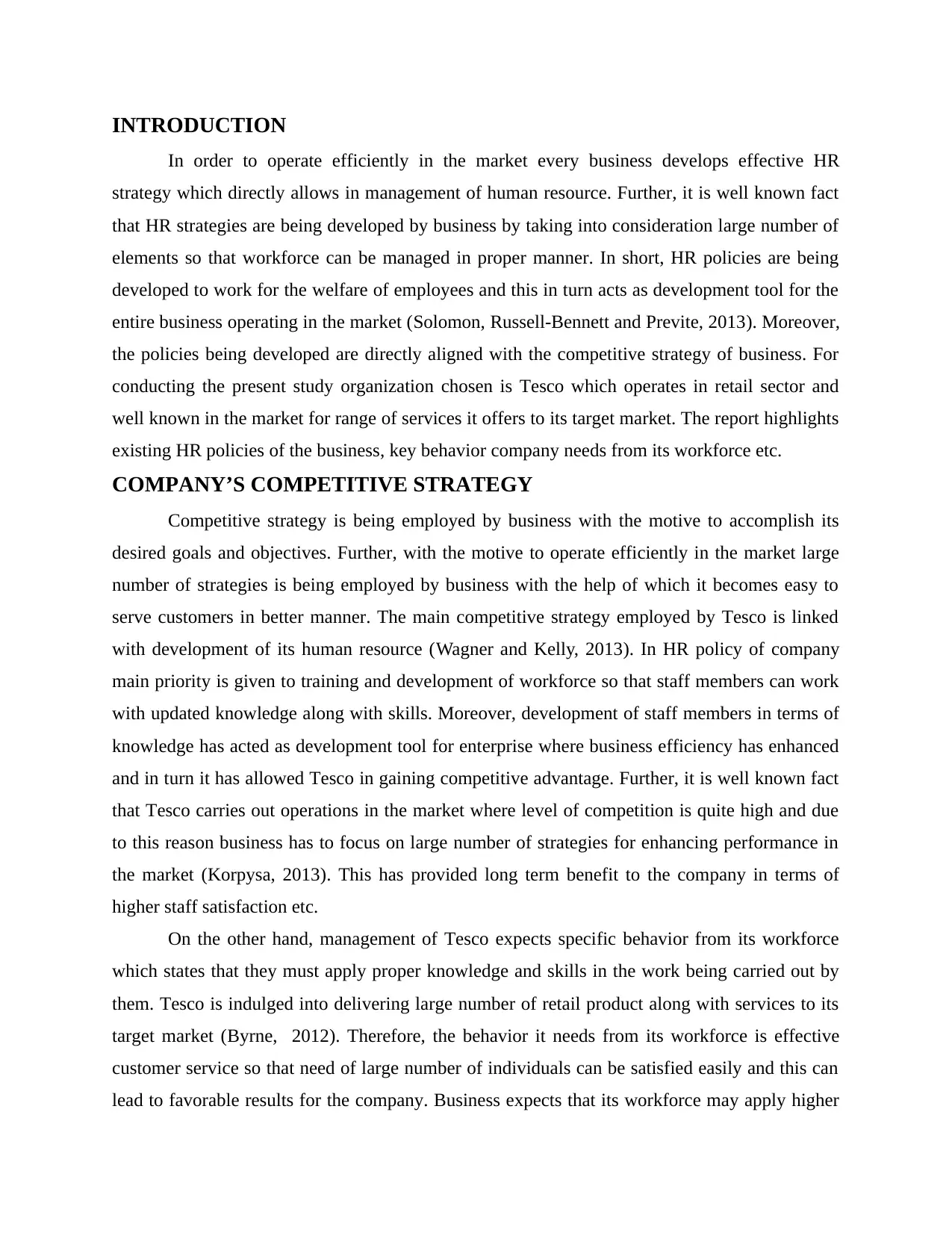
INTRODUCTION
In order to operate efficiently in the market every business develops effective HR
strategy which directly allows in management of human resource. Further, it is well known fact
that HR strategies are being developed by business by taking into consideration large number of
elements so that workforce can be managed in proper manner. In short, HR policies are being
developed to work for the welfare of employees and this in turn acts as development tool for the
entire business operating in the market (Solomon, Russell-Bennett and Previte, 2013). Moreover,
the policies being developed are directly aligned with the competitive strategy of business. For
conducting the present study organization chosen is Tesco which operates in retail sector and
well known in the market for range of services it offers to its target market. The report highlights
existing HR policies of the business, key behavior company needs from its workforce etc.
COMPANY’S COMPETITIVE STRATEGY
Competitive strategy is being employed by business with the motive to accomplish its
desired goals and objectives. Further, with the motive to operate efficiently in the market large
number of strategies is being employed by business with the help of which it becomes easy to
serve customers in better manner. The main competitive strategy employed by Tesco is linked
with development of its human resource (Wagner and Kelly, 2013). In HR policy of company
main priority is given to training and development of workforce so that staff members can work
with updated knowledge along with skills. Moreover, development of staff members in terms of
knowledge has acted as development tool for enterprise where business efficiency has enhanced
and in turn it has allowed Tesco in gaining competitive advantage. Further, it is well known fact
that Tesco carries out operations in the market where level of competition is quite high and due
to this reason business has to focus on large number of strategies for enhancing performance in
the market (Korpysa, 2013). This has provided long term benefit to the company in terms of
higher staff satisfaction etc.
On the other hand, management of Tesco expects specific behavior from its workforce
which states that they must apply proper knowledge and skills in the work being carried out by
them. Tesco is indulged into delivering large number of retail product along with services to its
target market (Byrne, 2012). Therefore, the behavior it needs from its workforce is effective
customer service so that need of large number of individuals can be satisfied easily and this can
lead to favorable results for the company. Business expects that its workforce may apply higher
In order to operate efficiently in the market every business develops effective HR
strategy which directly allows in management of human resource. Further, it is well known fact
that HR strategies are being developed by business by taking into consideration large number of
elements so that workforce can be managed in proper manner. In short, HR policies are being
developed to work for the welfare of employees and this in turn acts as development tool for the
entire business operating in the market (Solomon, Russell-Bennett and Previte, 2013). Moreover,
the policies being developed are directly aligned with the competitive strategy of business. For
conducting the present study organization chosen is Tesco which operates in retail sector and
well known in the market for range of services it offers to its target market. The report highlights
existing HR policies of the business, key behavior company needs from its workforce etc.
COMPANY’S COMPETITIVE STRATEGY
Competitive strategy is being employed by business with the motive to accomplish its
desired goals and objectives. Further, with the motive to operate efficiently in the market large
number of strategies is being employed by business with the help of which it becomes easy to
serve customers in better manner. The main competitive strategy employed by Tesco is linked
with development of its human resource (Wagner and Kelly, 2013). In HR policy of company
main priority is given to training and development of workforce so that staff members can work
with updated knowledge along with skills. Moreover, development of staff members in terms of
knowledge has acted as development tool for enterprise where business efficiency has enhanced
and in turn it has allowed Tesco in gaining competitive advantage. Further, it is well known fact
that Tesco carries out operations in the market where level of competition is quite high and due
to this reason business has to focus on large number of strategies for enhancing performance in
the market (Korpysa, 2013). This has provided long term benefit to the company in terms of
higher staff satisfaction etc.
On the other hand, management of Tesco expects specific behavior from its workforce
which states that they must apply proper knowledge and skills in the work being carried out by
them. Tesco is indulged into delivering large number of retail product along with services to its
target market (Byrne, 2012). Therefore, the behavior it needs from its workforce is effective
customer service so that need of large number of individuals can be satisfied easily and this can
lead to favorable results for the company. Business expects that its workforce may apply higher
Paraphrase This Document
Need a fresh take? Get an instant paraphrase of this document with our AI Paraphraser
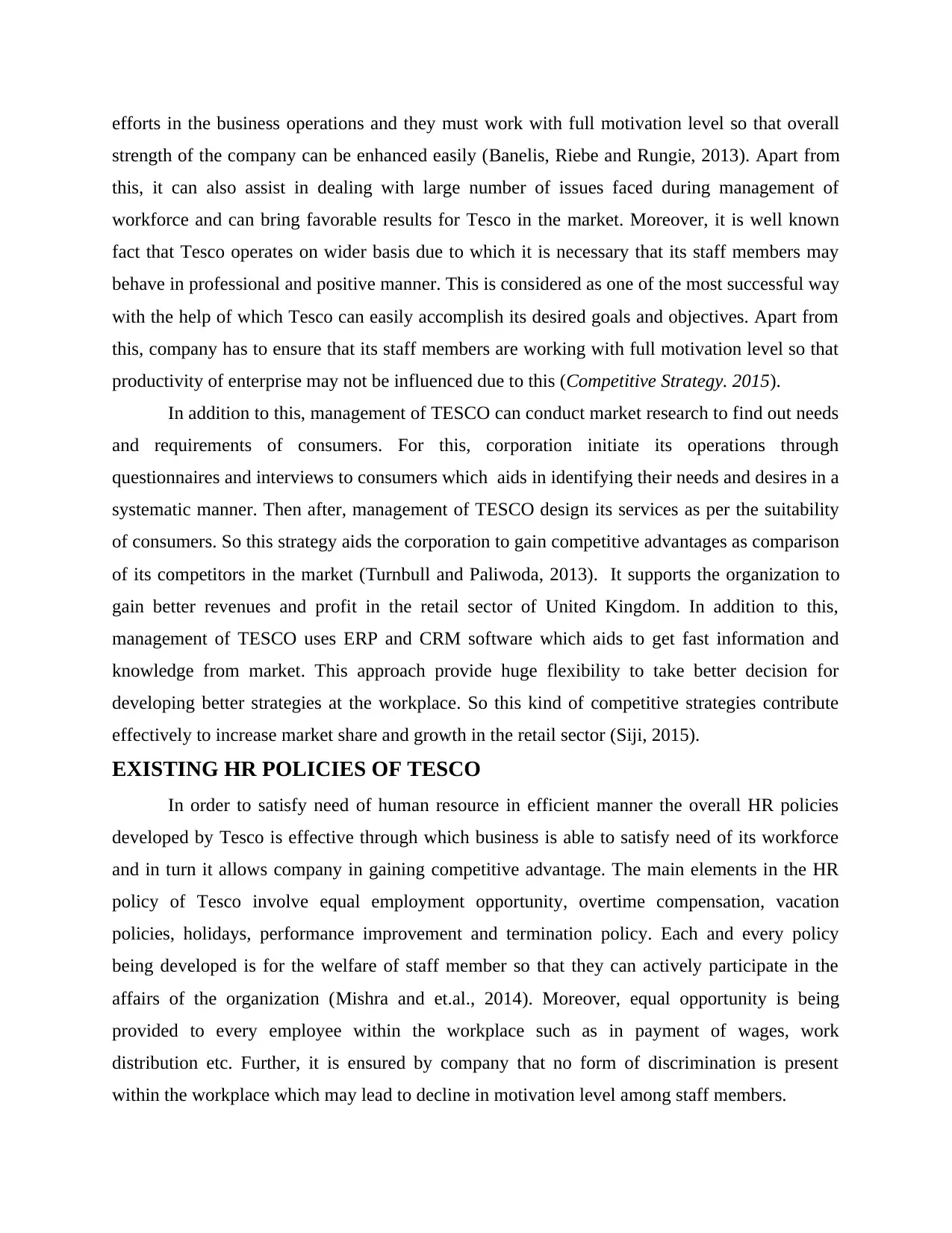
efforts in the business operations and they must work with full motivation level so that overall
strength of the company can be enhanced easily (Banelis, Riebe and Rungie, 2013). Apart from
this, it can also assist in dealing with large number of issues faced during management of
workforce and can bring favorable results for Tesco in the market. Moreover, it is well known
fact that Tesco operates on wider basis due to which it is necessary that its staff members may
behave in professional and positive manner. This is considered as one of the most successful way
with the help of which Tesco can easily accomplish its desired goals and objectives. Apart from
this, company has to ensure that its staff members are working with full motivation level so that
productivity of enterprise may not be influenced due to this (Competitive Strategy. 2015).
In addition to this, management of TESCO can conduct market research to find out needs
and requirements of consumers. For this, corporation initiate its operations through
questionnaires and interviews to consumers which aids in identifying their needs and desires in a
systematic manner. Then after, management of TESCO design its services as per the suitability
of consumers. So this strategy aids the corporation to gain competitive advantages as comparison
of its competitors in the market (Turnbull and Paliwoda, 2013). It supports the organization to
gain better revenues and profit in the retail sector of United Kingdom. In addition to this,
management of TESCO uses ERP and CRM software which aids to get fast information and
knowledge from market. This approach provide huge flexibility to take better decision for
developing better strategies at the workplace. So this kind of competitive strategies contribute
effectively to increase market share and growth in the retail sector (Siji, 2015).
EXISTING HR POLICIES OF TESCO
In order to satisfy need of human resource in efficient manner the overall HR policies
developed by Tesco is effective through which business is able to satisfy need of its workforce
and in turn it allows company in gaining competitive advantage. The main elements in the HR
policy of Tesco involve equal employment opportunity, overtime compensation, vacation
policies, holidays, performance improvement and termination policy. Each and every policy
being developed is for the welfare of staff member so that they can actively participate in the
affairs of the organization (Mishra and et.al., 2014). Moreover, equal opportunity is being
provided to every employee within the workplace such as in payment of wages, work
distribution etc. Further, it is ensured by company that no form of discrimination is present
within the workplace which may lead to decline in motivation level among staff members.
strength of the company can be enhanced easily (Banelis, Riebe and Rungie, 2013). Apart from
this, it can also assist in dealing with large number of issues faced during management of
workforce and can bring favorable results for Tesco in the market. Moreover, it is well known
fact that Tesco operates on wider basis due to which it is necessary that its staff members may
behave in professional and positive manner. This is considered as one of the most successful way
with the help of which Tesco can easily accomplish its desired goals and objectives. Apart from
this, company has to ensure that its staff members are working with full motivation level so that
productivity of enterprise may not be influenced due to this (Competitive Strategy. 2015).
In addition to this, management of TESCO can conduct market research to find out needs
and requirements of consumers. For this, corporation initiate its operations through
questionnaires and interviews to consumers which aids in identifying their needs and desires in a
systematic manner. Then after, management of TESCO design its services as per the suitability
of consumers. So this strategy aids the corporation to gain competitive advantages as comparison
of its competitors in the market (Turnbull and Paliwoda, 2013). It supports the organization to
gain better revenues and profit in the retail sector of United Kingdom. In addition to this,
management of TESCO uses ERP and CRM software which aids to get fast information and
knowledge from market. This approach provide huge flexibility to take better decision for
developing better strategies at the workplace. So this kind of competitive strategies contribute
effectively to increase market share and growth in the retail sector (Siji, 2015).
EXISTING HR POLICIES OF TESCO
In order to satisfy need of human resource in efficient manner the overall HR policies
developed by Tesco is effective through which business is able to satisfy need of its workforce
and in turn it allows company in gaining competitive advantage. The main elements in the HR
policy of Tesco involve equal employment opportunity, overtime compensation, vacation
policies, holidays, performance improvement and termination policy. Each and every policy
being developed is for the welfare of staff member so that they can actively participate in the
affairs of the organization (Mishra and et.al., 2014). Moreover, equal opportunity is being
provided to every employee within the workplace such as in payment of wages, work
distribution etc. Further, it is ensured by company that no form of discrimination is present
within the workplace which may lead to decline in motivation level among staff members.
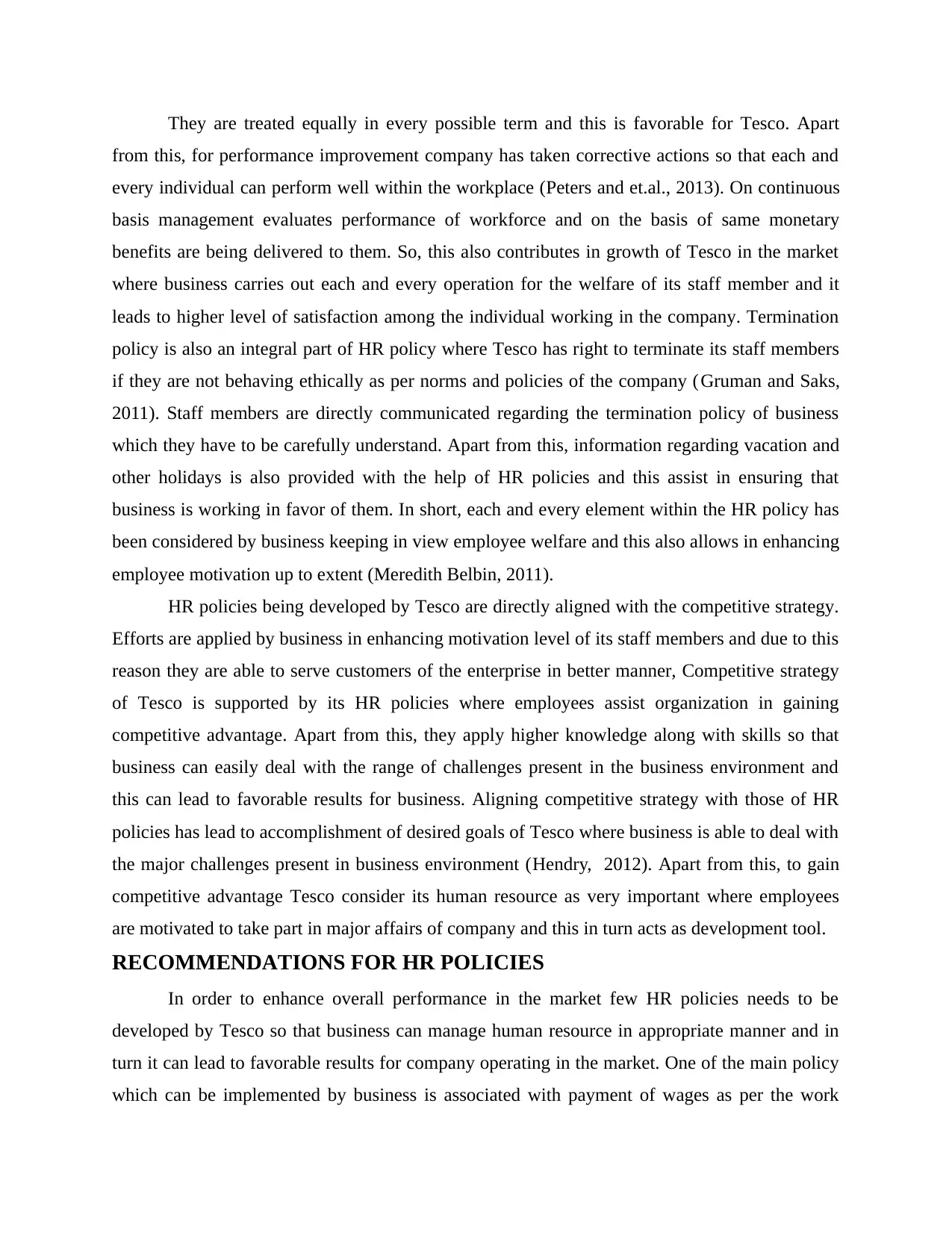
They are treated equally in every possible term and this is favorable for Tesco. Apart
from this, for performance improvement company has taken corrective actions so that each and
every individual can perform well within the workplace (Peters and et.al., 2013). On continuous
basis management evaluates performance of workforce and on the basis of same monetary
benefits are being delivered to them. So, this also contributes in growth of Tesco in the market
where business carries out each and every operation for the welfare of its staff member and it
leads to higher level of satisfaction among the individual working in the company. Termination
policy is also an integral part of HR policy where Tesco has right to terminate its staff members
if they are not behaving ethically as per norms and policies of the company (Gruman and Saks,
2011). Staff members are directly communicated regarding the termination policy of business
which they have to be carefully understand. Apart from this, information regarding vacation and
other holidays is also provided with the help of HR policies and this assist in ensuring that
business is working in favor of them. In short, each and every element within the HR policy has
been considered by business keeping in view employee welfare and this also allows in enhancing
employee motivation up to extent (Meredith Belbin, 2011).
HR policies being developed by Tesco are directly aligned with the competitive strategy.
Efforts are applied by business in enhancing motivation level of its staff members and due to this
reason they are able to serve customers of the enterprise in better manner, Competitive strategy
of Tesco is supported by its HR policies where employees assist organization in gaining
competitive advantage. Apart from this, they apply higher knowledge along with skills so that
business can easily deal with the range of challenges present in the business environment and
this can lead to favorable results for business. Aligning competitive strategy with those of HR
policies has lead to accomplishment of desired goals of Tesco where business is able to deal with
the major challenges present in business environment (Hendry, 2012). Apart from this, to gain
competitive advantage Tesco consider its human resource as very important where employees
are motivated to take part in major affairs of company and this in turn acts as development tool.
RECOMMENDATIONS FOR HR POLICIES
In order to enhance overall performance in the market few HR policies needs to be
developed by Tesco so that business can manage human resource in appropriate manner and in
turn it can lead to favorable results for company operating in the market. One of the main policy
which can be implemented by business is associated with payment of wages as per the work
from this, for performance improvement company has taken corrective actions so that each and
every individual can perform well within the workplace (Peters and et.al., 2013). On continuous
basis management evaluates performance of workforce and on the basis of same monetary
benefits are being delivered to them. So, this also contributes in growth of Tesco in the market
where business carries out each and every operation for the welfare of its staff member and it
leads to higher level of satisfaction among the individual working in the company. Termination
policy is also an integral part of HR policy where Tesco has right to terminate its staff members
if they are not behaving ethically as per norms and policies of the company (Gruman and Saks,
2011). Staff members are directly communicated regarding the termination policy of business
which they have to be carefully understand. Apart from this, information regarding vacation and
other holidays is also provided with the help of HR policies and this assist in ensuring that
business is working in favor of them. In short, each and every element within the HR policy has
been considered by business keeping in view employee welfare and this also allows in enhancing
employee motivation up to extent (Meredith Belbin, 2011).
HR policies being developed by Tesco are directly aligned with the competitive strategy.
Efforts are applied by business in enhancing motivation level of its staff members and due to this
reason they are able to serve customers of the enterprise in better manner, Competitive strategy
of Tesco is supported by its HR policies where employees assist organization in gaining
competitive advantage. Apart from this, they apply higher knowledge along with skills so that
business can easily deal with the range of challenges present in the business environment and
this can lead to favorable results for business. Aligning competitive strategy with those of HR
policies has lead to accomplishment of desired goals of Tesco where business is able to deal with
the major challenges present in business environment (Hendry, 2012). Apart from this, to gain
competitive advantage Tesco consider its human resource as very important where employees
are motivated to take part in major affairs of company and this in turn acts as development tool.
RECOMMENDATIONS FOR HR POLICIES
In order to enhance overall performance in the market few HR policies needs to be
developed by Tesco so that business can manage human resource in appropriate manner and in
turn it can lead to favorable results for company operating in the market. One of the main policy
which can be implemented by business is associated with payment of wages as per the work
⊘ This is a preview!⊘
Do you want full access?
Subscribe today to unlock all pages.

Trusted by 1+ million students worldwide
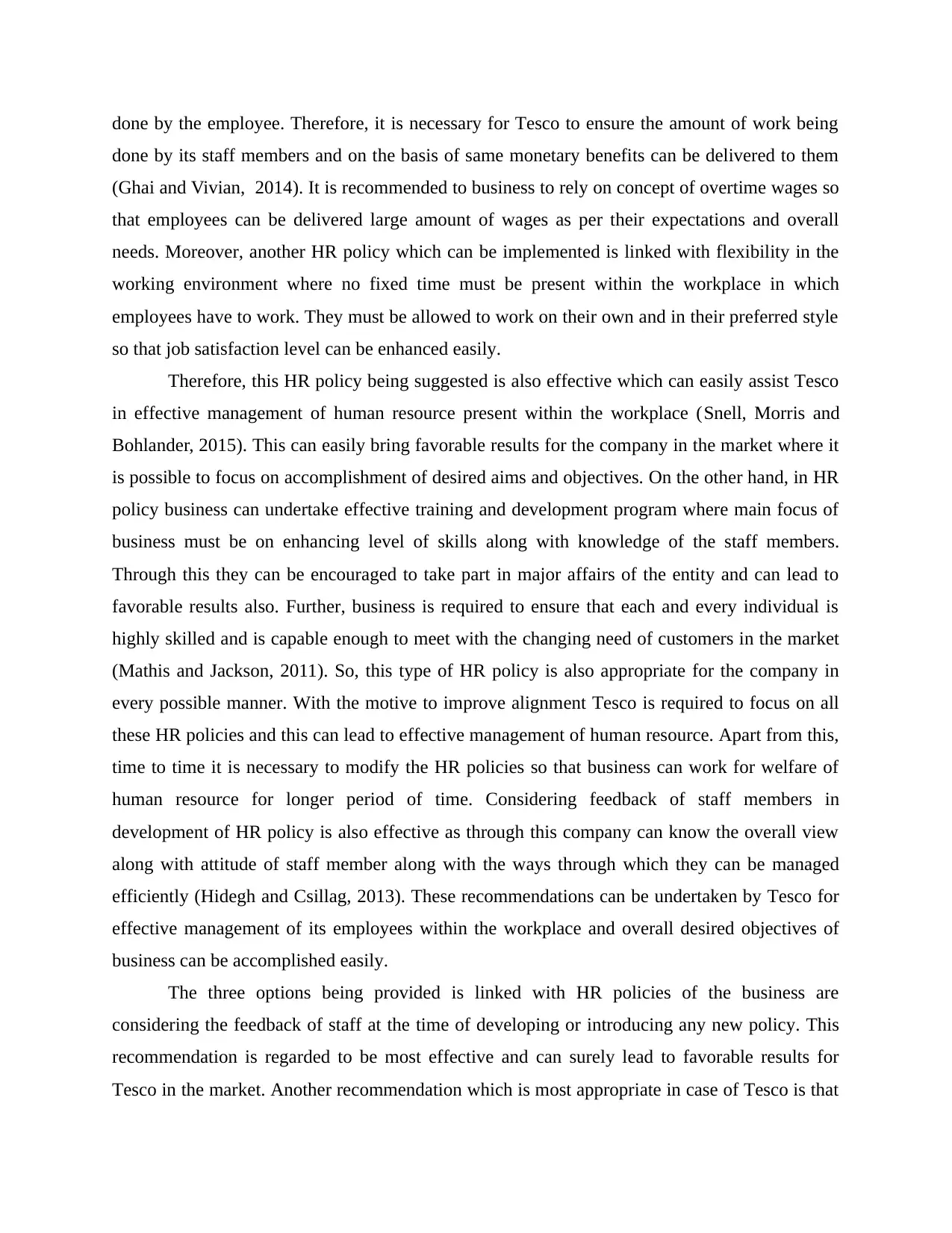
done by the employee. Therefore, it is necessary for Tesco to ensure the amount of work being
done by its staff members and on the basis of same monetary benefits can be delivered to them
(Ghai and Vivian, 2014). It is recommended to business to rely on concept of overtime wages so
that employees can be delivered large amount of wages as per their expectations and overall
needs. Moreover, another HR policy which can be implemented is linked with flexibility in the
working environment where no fixed time must be present within the workplace in which
employees have to work. They must be allowed to work on their own and in their preferred style
so that job satisfaction level can be enhanced easily.
Therefore, this HR policy being suggested is also effective which can easily assist Tesco
in effective management of human resource present within the workplace (Snell, Morris and
Bohlander, 2015). This can easily bring favorable results for the company in the market where it
is possible to focus on accomplishment of desired aims and objectives. On the other hand, in HR
policy business can undertake effective training and development program where main focus of
business must be on enhancing level of skills along with knowledge of the staff members.
Through this they can be encouraged to take part in major affairs of the entity and can lead to
favorable results also. Further, business is required to ensure that each and every individual is
highly skilled and is capable enough to meet with the changing need of customers in the market
(Mathis and Jackson, 2011). So, this type of HR policy is also appropriate for the company in
every possible manner. With the motive to improve alignment Tesco is required to focus on all
these HR policies and this can lead to effective management of human resource. Apart from this,
time to time it is necessary to modify the HR policies so that business can work for welfare of
human resource for longer period of time. Considering feedback of staff members in
development of HR policy is also effective as through this company can know the overall view
along with attitude of staff member along with the ways through which they can be managed
efficiently (Hidegh and Csillag, 2013). These recommendations can be undertaken by Tesco for
effective management of its employees within the workplace and overall desired objectives of
business can be accomplished easily.
The three options being provided is linked with HR policies of the business are
considering the feedback of staff at the time of developing or introducing any new policy. This
recommendation is regarded to be most effective and can surely lead to favorable results for
Tesco in the market. Another recommendation which is most appropriate in case of Tesco is that
done by its staff members and on the basis of same monetary benefits can be delivered to them
(Ghai and Vivian, 2014). It is recommended to business to rely on concept of overtime wages so
that employees can be delivered large amount of wages as per their expectations and overall
needs. Moreover, another HR policy which can be implemented is linked with flexibility in the
working environment where no fixed time must be present within the workplace in which
employees have to work. They must be allowed to work on their own and in their preferred style
so that job satisfaction level can be enhanced easily.
Therefore, this HR policy being suggested is also effective which can easily assist Tesco
in effective management of human resource present within the workplace (Snell, Morris and
Bohlander, 2015). This can easily bring favorable results for the company in the market where it
is possible to focus on accomplishment of desired aims and objectives. On the other hand, in HR
policy business can undertake effective training and development program where main focus of
business must be on enhancing level of skills along with knowledge of the staff members.
Through this they can be encouraged to take part in major affairs of the entity and can lead to
favorable results also. Further, business is required to ensure that each and every individual is
highly skilled and is capable enough to meet with the changing need of customers in the market
(Mathis and Jackson, 2011). So, this type of HR policy is also appropriate for the company in
every possible manner. With the motive to improve alignment Tesco is required to focus on all
these HR policies and this can lead to effective management of human resource. Apart from this,
time to time it is necessary to modify the HR policies so that business can work for welfare of
human resource for longer period of time. Considering feedback of staff members in
development of HR policy is also effective as through this company can know the overall view
along with attitude of staff member along with the ways through which they can be managed
efficiently (Hidegh and Csillag, 2013). These recommendations can be undertaken by Tesco for
effective management of its employees within the workplace and overall desired objectives of
business can be accomplished easily.
The three options being provided is linked with HR policies of the business are
considering the feedback of staff at the time of developing or introducing any new policy. This
recommendation is regarded to be most effective and can surely lead to favorable results for
Tesco in the market. Another recommendation which is most appropriate in case of Tesco is that
Paraphrase This Document
Need a fresh take? Get an instant paraphrase of this document with our AI Paraphraser
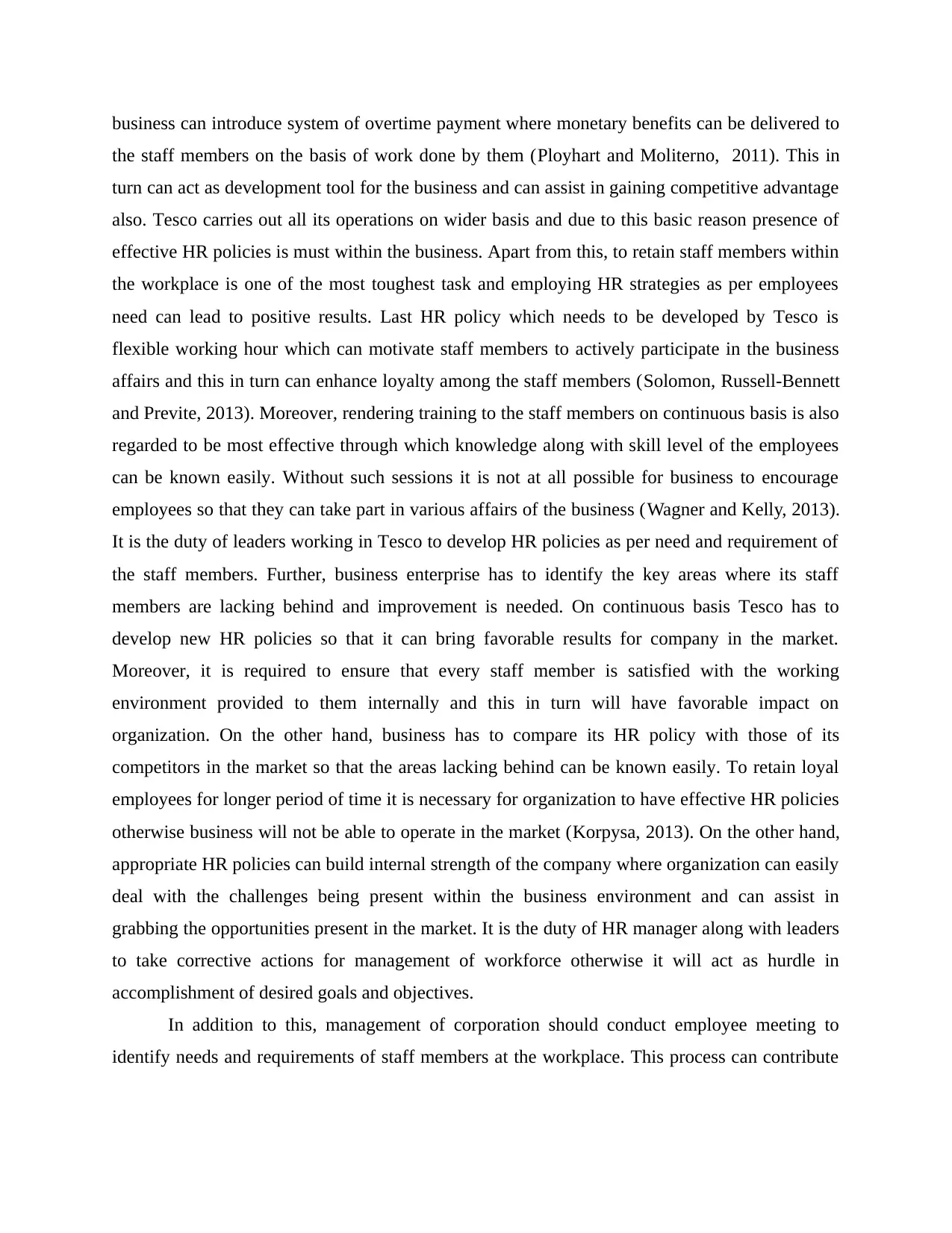
business can introduce system of overtime payment where monetary benefits can be delivered to
the staff members on the basis of work done by them (Ployhart and Moliterno, 2011). This in
turn can act as development tool for the business and can assist in gaining competitive advantage
also. Tesco carries out all its operations on wider basis and due to this basic reason presence of
effective HR policies is must within the business. Apart from this, to retain staff members within
the workplace is one of the most toughest task and employing HR strategies as per employees
need can lead to positive results. Last HR policy which needs to be developed by Tesco is
flexible working hour which can motivate staff members to actively participate in the business
affairs and this in turn can enhance loyalty among the staff members (Solomon, Russell-Bennett
and Previte, 2013). Moreover, rendering training to the staff members on continuous basis is also
regarded to be most effective through which knowledge along with skill level of the employees
can be known easily. Without such sessions it is not at all possible for business to encourage
employees so that they can take part in various affairs of the business (Wagner and Kelly, 2013).
It is the duty of leaders working in Tesco to develop HR policies as per need and requirement of
the staff members. Further, business enterprise has to identify the key areas where its staff
members are lacking behind and improvement is needed. On continuous basis Tesco has to
develop new HR policies so that it can bring favorable results for company in the market.
Moreover, it is required to ensure that every staff member is satisfied with the working
environment provided to them internally and this in turn will have favorable impact on
organization. On the other hand, business has to compare its HR policy with those of its
competitors in the market so that the areas lacking behind can be known easily. To retain loyal
employees for longer period of time it is necessary for organization to have effective HR policies
otherwise business will not be able to operate in the market (Korpysa, 2013). On the other hand,
appropriate HR policies can build internal strength of the company where organization can easily
deal with the challenges being present within the business environment and can assist in
grabbing the opportunities present in the market. It is the duty of HR manager along with leaders
to take corrective actions for management of workforce otherwise it will act as hurdle in
accomplishment of desired goals and objectives.
In addition to this, management of corporation should conduct employee meeting to
identify needs and requirements of staff members at the workplace. This process can contribute
the staff members on the basis of work done by them (Ployhart and Moliterno, 2011). This in
turn can act as development tool for the business and can assist in gaining competitive advantage
also. Tesco carries out all its operations on wider basis and due to this basic reason presence of
effective HR policies is must within the business. Apart from this, to retain staff members within
the workplace is one of the most toughest task and employing HR strategies as per employees
need can lead to positive results. Last HR policy which needs to be developed by Tesco is
flexible working hour which can motivate staff members to actively participate in the business
affairs and this in turn can enhance loyalty among the staff members (Solomon, Russell-Bennett
and Previte, 2013). Moreover, rendering training to the staff members on continuous basis is also
regarded to be most effective through which knowledge along with skill level of the employees
can be known easily. Without such sessions it is not at all possible for business to encourage
employees so that they can take part in various affairs of the business (Wagner and Kelly, 2013).
It is the duty of leaders working in Tesco to develop HR policies as per need and requirement of
the staff members. Further, business enterprise has to identify the key areas where its staff
members are lacking behind and improvement is needed. On continuous basis Tesco has to
develop new HR policies so that it can bring favorable results for company in the market.
Moreover, it is required to ensure that every staff member is satisfied with the working
environment provided to them internally and this in turn will have favorable impact on
organization. On the other hand, business has to compare its HR policy with those of its
competitors in the market so that the areas lacking behind can be known easily. To retain loyal
employees for longer period of time it is necessary for organization to have effective HR policies
otherwise business will not be able to operate in the market (Korpysa, 2013). On the other hand,
appropriate HR policies can build internal strength of the company where organization can easily
deal with the challenges being present within the business environment and can assist in
grabbing the opportunities present in the market. It is the duty of HR manager along with leaders
to take corrective actions for management of workforce otherwise it will act as hurdle in
accomplishment of desired goals and objectives.
In addition to this, management of corporation should conduct employee meeting to
identify needs and requirements of staff members at the workplace. This process can contribute
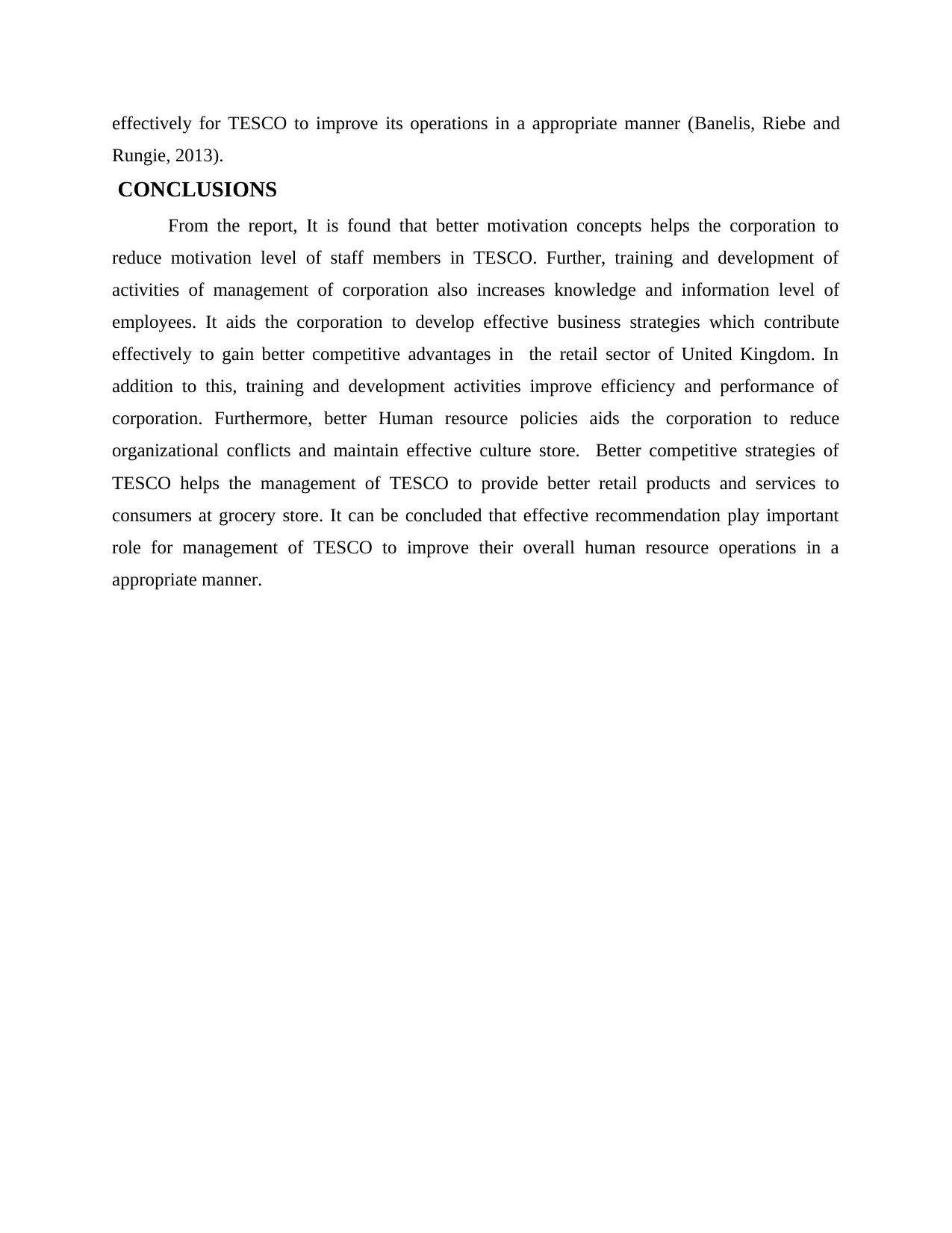
effectively for TESCO to improve its operations in a appropriate manner (Banelis, Riebe and
Rungie, 2013).
CONCLUSIONS
From the report, It is found that better motivation concepts helps the corporation to
reduce motivation level of staff members in TESCO. Further, training and development of
activities of management of corporation also increases knowledge and information level of
employees. It aids the corporation to develop effective business strategies which contribute
effectively to gain better competitive advantages in the retail sector of United Kingdom. In
addition to this, training and development activities improve efficiency and performance of
corporation. Furthermore, better Human resource policies aids the corporation to reduce
organizational conflicts and maintain effective culture store. Better competitive strategies of
TESCO helps the management of TESCO to provide better retail products and services to
consumers at grocery store. It can be concluded that effective recommendation play important
role for management of TESCO to improve their overall human resource operations in a
appropriate manner.
Rungie, 2013).
CONCLUSIONS
From the report, It is found that better motivation concepts helps the corporation to
reduce motivation level of staff members in TESCO. Further, training and development of
activities of management of corporation also increases knowledge and information level of
employees. It aids the corporation to develop effective business strategies which contribute
effectively to gain better competitive advantages in the retail sector of United Kingdom. In
addition to this, training and development activities improve efficiency and performance of
corporation. Furthermore, better Human resource policies aids the corporation to reduce
organizational conflicts and maintain effective culture store. Better competitive strategies of
TESCO helps the management of TESCO to provide better retail products and services to
consumers at grocery store. It can be concluded that effective recommendation play important
role for management of TESCO to improve their overall human resource operations in a
appropriate manner.
⊘ This is a preview!⊘
Do you want full access?
Subscribe today to unlock all pages.

Trusted by 1+ million students worldwide
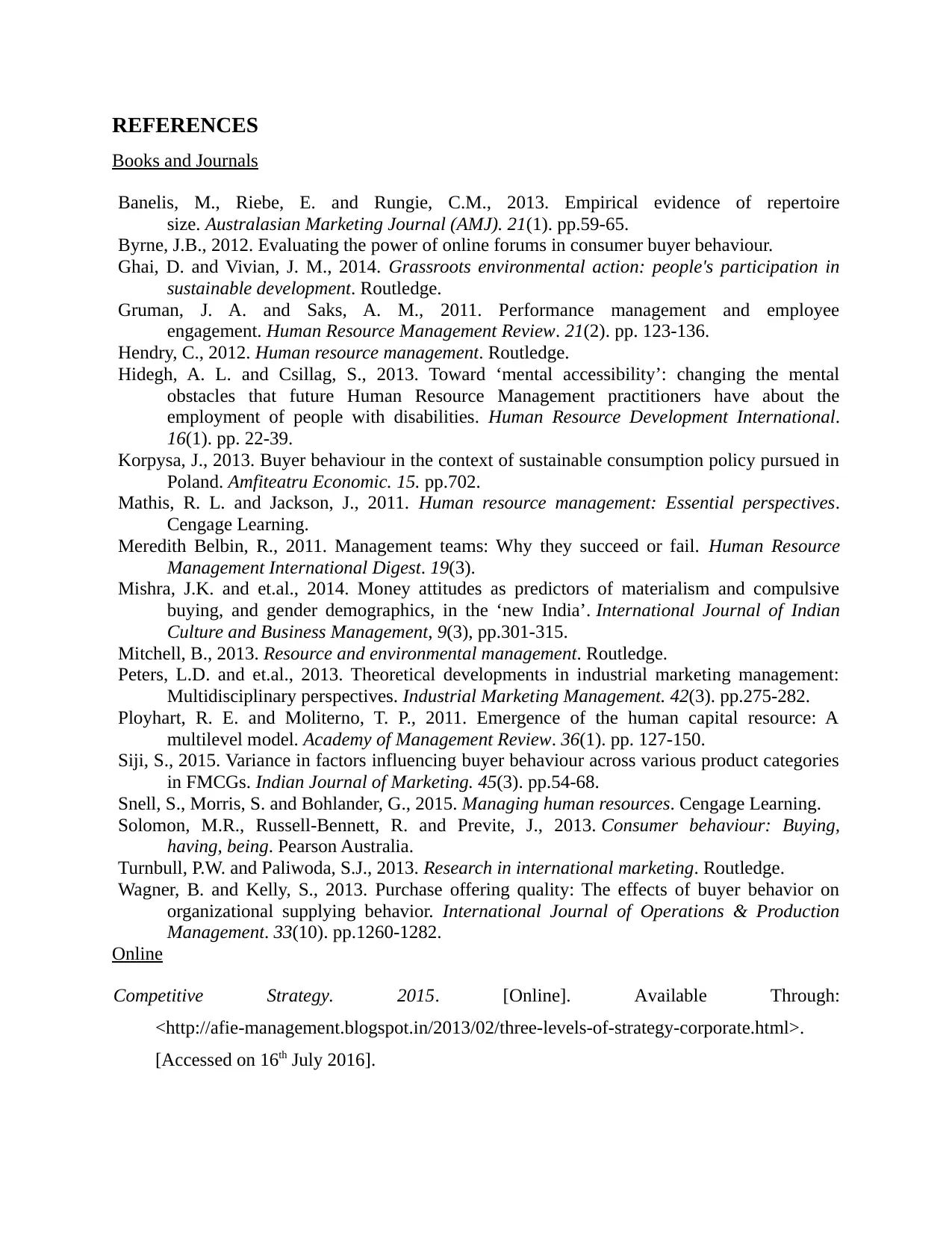
REFERENCES
Books and Journals
Banelis, M., Riebe, E. and Rungie, C.M., 2013. Empirical evidence of repertoire
size. Australasian Marketing Journal (AMJ). 21(1). pp.59-65.
Byrne, J.B., 2012. Evaluating the power of online forums in consumer buyer behaviour.
Ghai, D. and Vivian, J. M., 2014. Grassroots environmental action: people's participation in
sustainable development. Routledge.
Gruman, J. A. and Saks, A. M., 2011. Performance management and employee
engagement. Human Resource Management Review. 21(2). pp. 123-136.
Hendry, C., 2012. Human resource management. Routledge.
Hidegh, A. L. and Csillag, S., 2013. Toward ‘mental accessibility’: changing the mental
obstacles that future Human Resource Management practitioners have about the
employment of people with disabilities. Human Resource Development International.
16(1). pp. 22-39.
Korpysa, J., 2013. Buyer behaviour in the context of sustainable consumption policy pursued in
Poland. Amfiteatru Economic. 15. pp.702.
Mathis, R. L. and Jackson, J., 2011. Human resource management: Essential perspectives.
Cengage Learning.
Meredith Belbin, R., 2011. Management teams: Why they succeed or fail. Human Resource
Management International Digest. 19(3).
Mishra, J.K. and et.al., 2014. Money attitudes as predictors of materialism and compulsive
buying, and gender demographics, in the ‘new India’. International Journal of Indian
Culture and Business Management, 9(3), pp.301-315.
Mitchell, B., 2013. Resource and environmental management. Routledge.
Peters, L.D. and et.al., 2013. Theoretical developments in industrial marketing management:
Multidisciplinary perspectives. Industrial Marketing Management. 42(3). pp.275-282.
Ployhart, R. E. and Moliterno, T. P., 2011. Emergence of the human capital resource: A
multilevel model. Academy of Management Review. 36(1). pp. 127-150.
Siji, S., 2015. Variance in factors influencing buyer behaviour across various product categories
in FMCGs. Indian Journal of Marketing. 45(3). pp.54-68.
Snell, S., Morris, S. and Bohlander, G., 2015. Managing human resources. Cengage Learning.
Solomon, M.R., Russell-Bennett, R. and Previte, J., 2013. Consumer behaviour: Buying,
having, being. Pearson Australia.
Turnbull, P.W. and Paliwoda, S.J., 2013. Research in international marketing. Routledge.
Wagner, B. and Kelly, S., 2013. Purchase offering quality: The effects of buyer behavior on
organizational supplying behavior. International Journal of Operations & Production
Management. 33(10). pp.1260-1282.
Online
Competitive Strategy. 2015. [Online]. Available Through:
<http://afie-management.blogspot.in/2013/02/three-levels-of-strategy-corporate.html>.
[Accessed on 16th July 2016].
Books and Journals
Banelis, M., Riebe, E. and Rungie, C.M., 2013. Empirical evidence of repertoire
size. Australasian Marketing Journal (AMJ). 21(1). pp.59-65.
Byrne, J.B., 2012. Evaluating the power of online forums in consumer buyer behaviour.
Ghai, D. and Vivian, J. M., 2014. Grassroots environmental action: people's participation in
sustainable development. Routledge.
Gruman, J. A. and Saks, A. M., 2011. Performance management and employee
engagement. Human Resource Management Review. 21(2). pp. 123-136.
Hendry, C., 2012. Human resource management. Routledge.
Hidegh, A. L. and Csillag, S., 2013. Toward ‘mental accessibility’: changing the mental
obstacles that future Human Resource Management practitioners have about the
employment of people with disabilities. Human Resource Development International.
16(1). pp. 22-39.
Korpysa, J., 2013. Buyer behaviour in the context of sustainable consumption policy pursued in
Poland. Amfiteatru Economic. 15. pp.702.
Mathis, R. L. and Jackson, J., 2011. Human resource management: Essential perspectives.
Cengage Learning.
Meredith Belbin, R., 2011. Management teams: Why they succeed or fail. Human Resource
Management International Digest. 19(3).
Mishra, J.K. and et.al., 2014. Money attitudes as predictors of materialism and compulsive
buying, and gender demographics, in the ‘new India’. International Journal of Indian
Culture and Business Management, 9(3), pp.301-315.
Mitchell, B., 2013. Resource and environmental management. Routledge.
Peters, L.D. and et.al., 2013. Theoretical developments in industrial marketing management:
Multidisciplinary perspectives. Industrial Marketing Management. 42(3). pp.275-282.
Ployhart, R. E. and Moliterno, T. P., 2011. Emergence of the human capital resource: A
multilevel model. Academy of Management Review. 36(1). pp. 127-150.
Siji, S., 2015. Variance in factors influencing buyer behaviour across various product categories
in FMCGs. Indian Journal of Marketing. 45(3). pp.54-68.
Snell, S., Morris, S. and Bohlander, G., 2015. Managing human resources. Cengage Learning.
Solomon, M.R., Russell-Bennett, R. and Previte, J., 2013. Consumer behaviour: Buying,
having, being. Pearson Australia.
Turnbull, P.W. and Paliwoda, S.J., 2013. Research in international marketing. Routledge.
Wagner, B. and Kelly, S., 2013. Purchase offering quality: The effects of buyer behavior on
organizational supplying behavior. International Journal of Operations & Production
Management. 33(10). pp.1260-1282.
Online
Competitive Strategy. 2015. [Online]. Available Through:
<http://afie-management.blogspot.in/2013/02/three-levels-of-strategy-corporate.html>.
[Accessed on 16th July 2016].
1 out of 10
Related Documents
Your All-in-One AI-Powered Toolkit for Academic Success.
+13062052269
info@desklib.com
Available 24*7 on WhatsApp / Email
![[object Object]](/_next/static/media/star-bottom.7253800d.svg)
Unlock your academic potential
Copyright © 2020–2026 A2Z Services. All Rights Reserved. Developed and managed by ZUCOL.





